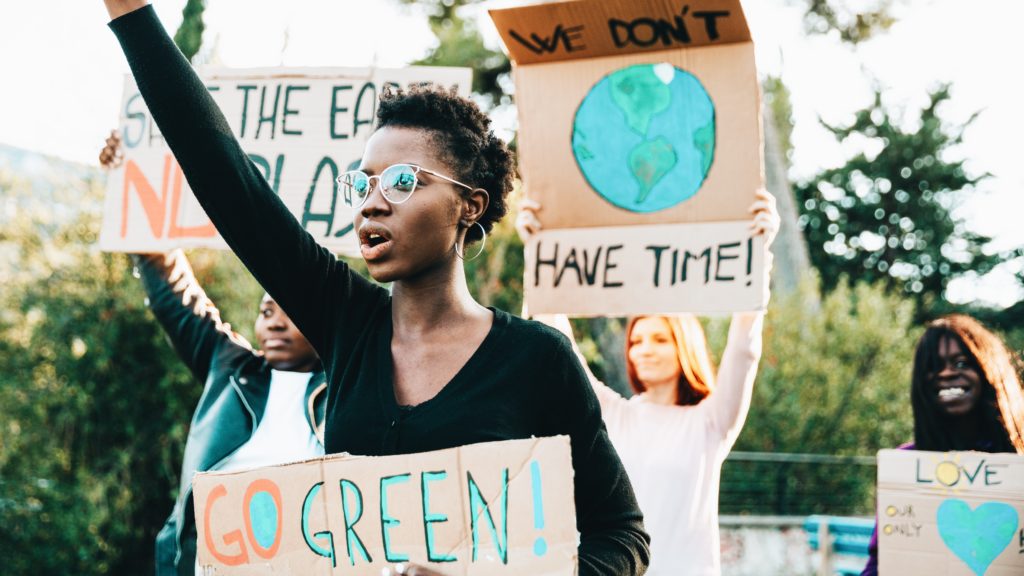According to the UN, the next 10 years must include increasingly ambitious sustainability efforts if the world is to meet its 2030 Sustainable Development Goals and successfully mitigate climate change.
This year — 2020 — marked the beginning of a “decade of action” leading up to this deadline and saw both significant progress and difficult setbacks related to the environment, climate justice, and global equity in general.
According to The Intergovernmental Panel on Climate Change (IPPC), only immediate action will prevent further escalation of the climate crisis. Fortunately, 2020 has seen an increased emphasis on the urgency of the climate crisis and laid the foundations for progress to come.

The decade of action
A recent report by the Climate Action Tracker group — as seen and reported by the BBC — indicated that the goals of the UN’s Paris climate agreement could now be “within reach.”
Climate Action Tracker took into account both recent pledges from China and the carbon plans of the U.S. President-Elect Joe Biden. Though some experts cautioned that additional short-term plans to cut carbon emissions must match this optimism. 2020 is still on track to be one of the three hottest years on record — and one of the six warmest since 1850.
In addition to the COVID-19 crisis, 2020 has seen a significant increase in natural disasters such as the California wildfires, the latter stages of the Australian bushfires, and more recently, a record-breaking Atlantic hurricane season.
A growing body of scientific research shows that rising global temperatures are increasing the frequency, intensity, and duration of extreme weather events. Previous predictions warned of up to 3C warming, which would have severe and unavoidable global consequences. But the new national commitments from China and the U.S. could potentially help halt global warming at 2.1C.
Public perception of climate change reflects this, and the issue has been more widely addressed in 2020 than ever before. Individuals are making lifestyle changes to mitigate their environmental footprint, as are organizations, companies, and even governments. Increased legislation has helped reinforce sustainability measures — as well as animal welfare — and the future of renewable energy looks bright. Here’s what this year got right about climate justice.
The climate crisis is finally a top priority
Increased global awareness has, arguably, led to increased national commitments. A poll conducted by The Washington Post and nonprofit Kaiser Family Foundation (KFF) revealed that more Americans than ever before are concerned about the environment. Today, approximately eight out of every 10 people believe human activity is continuing to fuel climate change.
Around 50 percent of those polled believe urgent action is needed, while four out of 10 describe climate change as a “crisis” — up from less than 25 percent five years ago. In the UK, research by Cardiff University and Climate Outreach found that twice as many Brits were worried about climate change compared to three years ago. Twenty-three percent of participants described global warming as the number one issue of the next two decades.
Growing global awareness of The Black Lives Matter movement and institutional prejudice has also prompted more widespread discussion of environmental racism, both across the U.S. and around the world. The effects of climate change will disproportionately impact marginalized communities, and people of color are far more likely to be concerned about environmental issues.
Climate change will also disproportionately impact young people, and it is frequently cited as the leading cause of concern by children and youths around the world. It is also young people, in particular, who are instrumental in raising awareness of environmental issues, as seen in the school climate strikes. This is reflected in changing attitudes to climate education.
Climate change education is crucial
This year, New Jersey became the first U.S. state to introduce mandatory climate change education throughout all subjects, at every grade level. While Italy became the first country to introduce such a program nationwide. Italian students will learn about sustainability through both traditional subjects and a weekly, hour-long study of the ongoing crisis.
Elsewhere, universities have also launched new climate change-focused courses. The UK’s University of Sheffield added a compulsory class on sustainability and plans to embed Education for Sustainable Development (ESD) into every single course available at the university.
In Trom-Somanya, Ghana, an entirely new university is being created to tackle climate change. The University of Environment and Sustainable Development (UESD) will offer classes including energy sustainability, environmental economics, climate change, environmental policy, and water resources development.
In a letter to Biden, two former U.S. education secretaries recently urged his administration to help educate and prepare the millions of children in public schools for the effects of climate change. As reported by The Guardian, John King and Arne Duncan said that this is a “critical opportunity.”
It said: “Supporting students today in learning about climate change and providing the opportunity to explore and consider climate solutions will increase the resilience of our society as well as our competitiveness in a green economy.”
As more people become concerned about mitigating the impact of climate change, many have taken personal steps to minimize their environmental footprint, including cutting back on meat, dairy, and other animal products.

A global shift towards plant-based food
At the start of 2020 more than 20 million Brits — around 40 percent of all meat-eaters — announced their intention to cut back on animal products throughout the year. Predominantly for personal and environmental health.
The COVID-19 pandemic has prompted additional sales in plant-based meat and milk, in particular, as more people become aware of the link between zoonotic disease and animal agriculture. Nearly 8 million Brits have eaten more vegan food since the start of the crisis.
The global food industry has responded to this increased demand by launching countless new and expanded vegan options from major fast-food chains, supermarkets, and even meat producers. In the UK, shops added an unprecedented number of private-label vegan Christmas options. While in the U.S., plant-based brands such as Beyond Meat came close to price parity with traditional meat, making meat-free foods more accessible than ever before.
Along with Eat Just, Right Treat, and Cargill, Beyond continued to make significant inroads in China’s increasingly popular vegan food market. COVID is increasing the demand for meat-free alternatives in Asia, in general, and the regional markets are increasingly competitive.
This year started off with a run of plant-based awards ceremonies, and The Golden Globes released a statement specifically highlighting the need for environmental sustainability. Even local and national governments are ditching meat, as are schools and hospitals in the UK.
According to a recent report commissioned by Blue Horizon and PWC, replacing 10 percent of animal agriculture with plant-based alternatives could save the equivalent of 2.7 billion trees in CO2 emissions. Previous data indicate that eating less meat — and more plant-based foods — is one of the most effective ways to combat climate change.
Decisive action against the wildlife trade
This year also saw a significant increase in pressure to end the wildlife trade after it was linked with COVID. In July, Vietnam fully banned both wildlife markets and imports. While China took steps to ban the use of wild animals as food, announcing “severe” punishments for illegal hunting and trading. Pangolin scales, specifically, were removed from the approved Traditional Chinese Medicine ingredients list, though medicinal use of the animal was not banned entirely.
In the U.S., 66 lawmakers requested a global ban on wet markets to reduce the risk of additional pandemics. While several prominent figures, activists, and celebrities — including actors Leonardo DiCaprio and Courtney Cox, and celebrated anthropologist Dr. Jane Goodall — spoke out against both wet markets and the wildlife trade in general.
“I’m hoping that governments around the world will cooperate with the facts and that there will be a global ban on all of these markets, trafficking, and eating of wildlife,” Goodall told The Independent. “If we go on treating animals the way that we are, that is going to hit back on us, as it has.”
Up to 75 percent of all emerging infectious diseases are zoonotic in nature. According to the Centers for Disease Control, around 72 percent of these originate from wildlife. Many experts believe that moving forward, most emerging infectious diseases will be zoonotic in nature.
The presence of COVID on several mink farms has led to further international commitments to end fur farming. Just last month, Hungary banned the farming of mink, foxes, polecats, ferrets, and coypu. The Dutch government announced that all mink farms would close permanently by 2021, while France aims to end the practice by 2025.
Plastic bans and increased climate legislation
Increased legislation has also further targeted key environmental issues. Plastic bag bans are increasingly widespread, and 2020 saw Canada, Austria, the Bahamas, and the Indonesia city of Jakarta launch or announce restrictions. Japan introduced a nationwide plastic bag charge, and the UK’s plastic straw ban finally took effect.
There has also been increasing study and development of sustainable alternatives to plastic. Several major companies, including Adidas and Stella McCartney, announced plans to incorporate vegan-friendly leather made from mycelium: the roots of mushrooms. While banana tree relative abaca could provide a solution to the urgent need for plastic-free PPE.
More recently, the British government announced plans to make climate risk reports compulsory for all large companies within the next five years. The largest companies, such as BP, HSBC, Tesco, Vodafone, and GlaxoSmithKline, will have to analyze and disclose the likelihood and consequences of global warming.
A nationwide ban on new, solely fossil fuel-based cars was also announced by the British government and is expected to take effect from 2030. These updates and announcements are part of the UK’s larger 10-point plan for a “green industrial revolution” to combat the climate crisis in general.
In Denmark, parliament passed the landmark Climate Act, which will make it illegal to not act on climate change — no matter what government is currently in power. Every five years, the Danish government will have to set legally binding climate goals for the following decade.
Several European countries have reduced their energy emissions, and 2020 saw 13 nations pledge to be coal-free in the next decade. In April, Austria closed its last coal plant, with a view to transitioning to 100 percent renewables by 2030. Just one week later, Sweden closed its last coal plant a full two years ahead of schedule.
The future of technology and renewable energy
New technology is making renewable energy more achievable than ever and reducing the need for fossil fuels such as coal. Cutting-edge innovations such as the AuREUS system — which uses food waste to generate accessible solar energy — give hope for an even greener and more equitable new year.
According to the International Energy Agency (IEA), solar energy is now mostly cheaper than coal. The IEA also predicted that the next 10 years could see around 80 percent of global electricity demand growth met by renewable sources.
“I see solar becoming the new king of the world’s electricity markets,” Dr. Fatih Birol, the IEA Executive Director, said in a press release. “Based on today’s policy settings, it is on track to set new records for deployment every year after 2022.”


